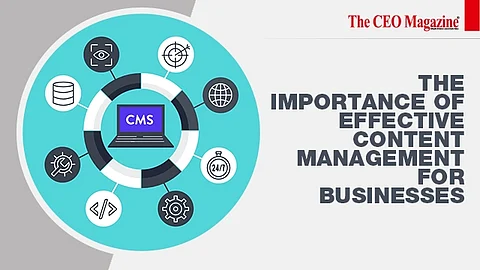
- News
- Women
- Magazine
- IndustryIndustry
- InsightsInsights
- Success Stories
- PublishPublish
- ContactContact
- Media KitMedia Kit

The Importance of Effective Content Management for Businesses
In today's digital age, businesses must create and publish vast amounts of content across multiple platforms to engage with their target audience. However, managing this content can be a challenging task, especially for organisations with limited resources.
This is where effective content management comes into play. This article will discuss the importance of content management for businesses and the key elements that contribute to a successful content management strategy.
Content management refers to the process of organising, storing, and distributing content across various platforms to ensure it reaches its intended audience.
Content can include text, images, videos, and audio files. A content management system (CMS) is a software application enabling businesses to manage and publish content efficiently.
Effective content management provides several benefits for businesses, including:
Consistent brand messaging: A well-planned content management strategy ensures that your content reflects your brand's messaging and values across all platforms.
Improved customer engagement: Relevant and high-quality content can attract and engage your target audience, which can lead to increased brand loyalty and customer retention.
Increased efficiency: A content management system can automate several tasks, such as content scheduling and distribution, which can save time and resources.
Better collaboration: A CMS allows teams to collaborate on content creation and management, enabling faster and more efficient workflows.
To develop a successful content management strategy, businesses should consider the following key elements:
Content planning: Develop a content calendar and strategy that aligns with your business goals and audience needs.
Content creation: Create high-quality and engaging content that resonates with your target audience.
Content organisation: Organize your content in a structured manner, such as by using tags, categories, and metadata, to make it easier to manage and find.
Content distribution: Choose the appropriate channels to distribute your content, such as social media platforms, email, or your website.
Content analysis: Measure the effectiveness of your content management strategy through metrics such as engagement rates, traffic, and conversions.
Effective content management is crucial for businesses in today's digital landscape.
By implementing a content management strategy that includes planning, creation, organisation, distribution, and analysis, businesses can improve brand messaging, customer engagement, and overall efficiency.
Investing in a content management system can also enable better collaboration and automation, leading to even more significant benefits for businesses.
Follow us on Google News
